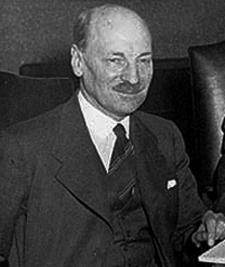 Image via Wikipedia
Image via WikipediaI get this info from the Wikipedia page on the topic, so I'm certainly no expert. The logic behind it kind of suggests that perhaps there's a stigma against voting Tory that people sought to overcome, or rather that people shrunk from while talking to surveyors. I think there might be an aspect of truth to that, and the more paranoid of Conservative supporters might have felt that there was a large aspect of truth to it (perhaps moreso in 1997, seemingly less so today). I do wonder, though, if it's not a variation on a trend that pollsters have certainly observed in Canada, and perhaps in other countries too: that people tend to be more 'experimental' when talking theoretically before the day than they are when actually ticking boxes on the day. In Canada, this manifests itself in the tendency for polling companies to overstate voting intentions for the New Democratic Party - and more recently the Green Party.
In Canada, it works like this: there is a certain percentage of the populace who, before election day, will claim an intent to vote NDP but who, on the day itself, suddenly 'choke' and vote Liberal (it could be other parties, but primarily Liberal) for two different reasons: (1) a gut feeling that the untested NDP would be too inexperienced to runn a good government in comparison to the extrememly-experienced Liberal Party, and (2) the old yarn that the NDP have no chance of forming a government anyway, so voting for them is a waste of a vote. This is made explicit when you consider tactical voting, which in Canada is generally used against Conservatives as opposed to against any other party. So it's the opposite of the Shy Tory Factor. Call it a Bold NDP Factor.
Which brings us to the current Liberal Democrat 'bubble' that is making such headlines in the UK - the fact that, in the week since the first televised debate, pollsters are consistently showing the LibDems well ahead of Labour and neck-in-neck with the Conservatives. Leaving aside for the moment the huge gap between expected voter intention and the expected parliament balance it will return, it raises a question: if we head into election day with comparable polling numbers, will we find either of these phenomena arising? To word it differently:
- Could the current Conservative numbers (that show the party vying for first place as opposed to the comfortable first-place they've been enjoying for years now) actually be lower than reality, and on election day will we find an unexpected surge in Tory numbers?
- Alternately, given the fact that the Wikipedia article discusses ways that pollsters have attempted to account for the Shy Tory Factor, is it possible now that the Shy Tory Factor no longer exists (the anger against the Labour government has caused Tory voters to set their qualms aside), leaving us with artificially inflated Tory numbers at the moment?
- Could there be a 'bold LibDem' factor? Namely, could a certain percentage of the electorate presently claiming an intention to vote LibDem suddenly get cold feet on election day, concerned about their ability to govern or their ability to form a government, and transfer their vote to the Conservatives or Labour (both of which seem like possibilities)?

![Reblog this post [with Zemanta]](http://img.zemanta.com/reblog_e.png?x-id=01aa8066-480e-4779-832f-e92abc8bd54e)
No comments:
Post a Comment